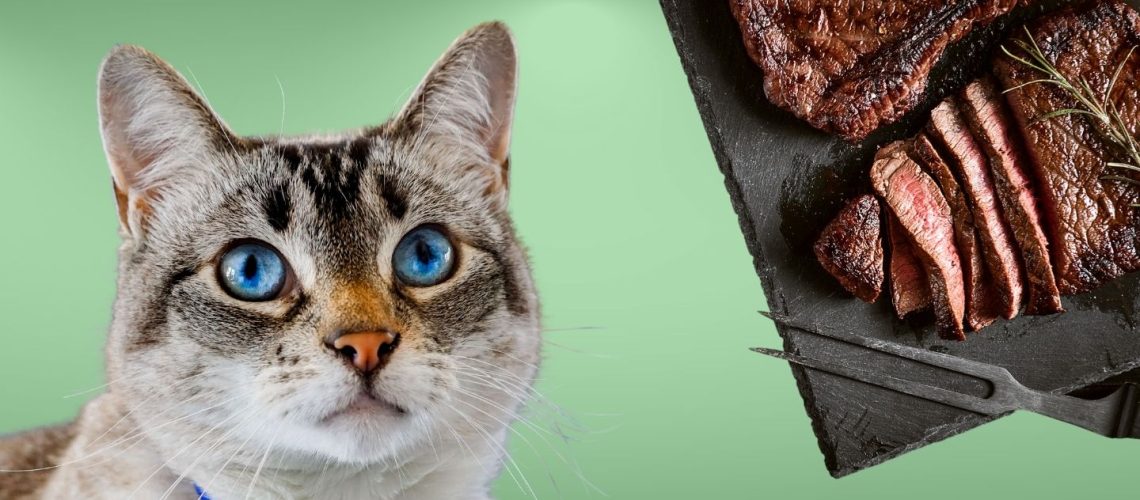The short answer is yes, cats can eat steak. However, it is important to note that steak should only be given to cats plain – without salt and added spices or sauces. Cats are obligate carnivores, meaning that they require a diet that is primarily made up of meat to meet their nutritional requirements. Steak can indeed provide valuable nutrients that contribute to a cat's overall health, but it is important to be aware of the potential risks and ensure proper portion sizes.
Nutritional Benefits of Steak for Cats
Steak is a rich source of protein and amino acids, which are vital for your cat's muscle growth, organ development, and immune system support. In addition to protein, steak contains a number of essential vitamins and minerals that contribute to a cat's health.
Iron
Iron is important for producing hemoglobin, the protein that carries oxygen in the blood. A lack of iron can lead to anemia, and steak supplies a readily bioavailable source of this mineral.
Zinc
Zinc is crucial for skin and coat health, wound healing, and immune function in cats. Steak offers a good source of this essential mineral.
Vitamin B12
Vitamin B12 plays a critical role in maintaining nerve function and producing red blood cells. It is found in high quantities in steak, making it a valuable addition to a cat's diet.
Omega-3 fatty acids
Steak can provide a small amount of omega-3 fatty acids, which have anti-inflammatory properties and can benefit a cat's cardiovascular and cognitive health.
Taurine content
Taurine is an essential amino acid for cats, required for heart, eye, and brain function. While steak does not contain a high amount of taurine compared to other meats like chicken or turkey, it still contributes to meeting a cat's taurine requirements.
Risks of Feeding Steak to Cats
Feeding steak to cats comes with some potential risks that should be considered before including it in their diet.
Bacterial contamination in raw steak
Raw steak may be contaminated with bacteria such as Salmonella or E. coli, which can cause food poisoning in cats. Symptoms of food poisoning may include vomiting, diarrhea, loss of appetite, and signs of dehydration. To avoid these issues, always cook the steak thoroughly and practice safe handling of raw meat.
High fat content of fried steak
Fried steaks are high in fat, which can lead to weight gain and obesity in cats. Overweight cats are at an increased risk of developing health problems, such as diabetes, liver disease, and heart disease. To minimize this risk, opt for boiling, baking, or air-frying the steak rather than frying.
Choking hazard from bones
If steak contains bones, these can pose a choking hazard or cause injury to your cat's digestive tract. Make sure to remove any bones from the steak before feeding it to your cat.
Potential allergic reactions
Some cats may have an allergy or intolerance to beef. If you notice any signs of an allergic reaction, such as itching, vomiting, or diarrhea, discontinue feeding steak to your cat and consult your veterinarian.
Proper Portion Size for Cats
When giving steak to your cat, it is important to feed it in moderation. Factors such as age, weight, and activity level should be considered when determining the right amount of steak for your cat. Make sure to balance their diet with other food sources to provide a well-rounded nutritional profile.
Gradually introduce steak into your cat's diet and monitor for any adverse reactions. If you are unsure about how much steak to feed your cat or have concerns about their nutritional needs, consult your veterinarian for guidance.
Alternative Protein Sources for Cats
While steak can be a healthy protein source for cats, there are other options to consider as well. These may include:
- Chicken
- Turkey
- Fish
- Lamb
- Commercially available cat food, which often contains a blend of protein sources
Conclusion
In conclusion, cats can eat steak. This meat is loaded with protein, vitamins, and minerals that can contribute to a cat's overall health. However, it is important to be aware of the potential risks associated with feeding steak to cats and to ensure proper portion sizes and preparation methods. Steak can be a beneficial part of your cat's diet when fed in moderation and balanced with other food sources. Lastly, monitor your cat's health and consult your veterinarian if you have any concerns about their dietary needs.











